Bathsheba Transatlantic
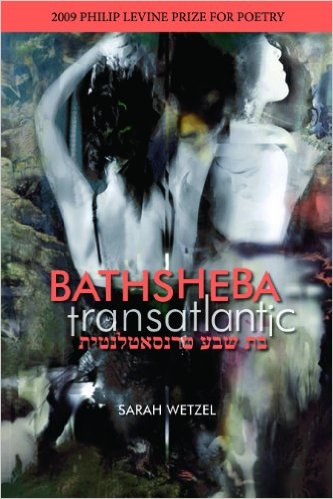
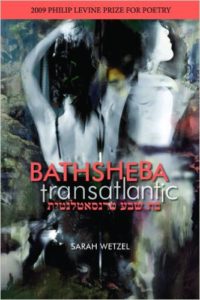 by Sarah Wetzel,
by Sarah Wetzel,
Anhinga Press, 2010,
98 pages, paper, $17.00,
ISBN: 978–1–934695–21–0
Buy the Book
Reading the cover of Sarah Wetzel’s mind – shaking debut volume of poems, I was struck by Timothy Liu’s comment that he saw this book as a “dialogue between the Middle East and Manhattan, between a Bathsheba depicted by Rembrandt on the one hand and mythologized by the Old Testament on the
other. . . . ”
I think much of the conversation here occurs, in fact, between the selves that Sarah discovers within herself as she tries to learn the map of her own heart.
We are surrounded by conflict. Every day another portion of the world erupts, and yet we worry about being on time for our appointments, meet friends for dinner, call our children
from the back steps as evening comes. Wetzel lives in Israel and Manhattan, and the activities of daily life that fill her poems stretch like bridges between razor – wired borders. They speak not only of the conflict between countries, but of how infiltration occurs within hearts, within families. Her lines hum with tension and pause to catch moments of beauty and terror with either hand, because any moment could explode. Reading this book is like riding a rocket that may fall at any time. Even a short quote from the poem “Rehearsing for Rockets” loads the tension of impending violence against the plan for survival:
The six – year old girl under my hand squirms
as I fit a gas mask to her small face.
Behind a chemical toilet we’ve stacked
canned food and bottled water, crayons
and coloring books. We’re practicing
for when the rockets drop.
Wetzel’s language here is as straightforward as a catalogue, but behind it lays the fear, the one eye and one ear that must always be focused on the sky while trying to comfort the child. What is not written in these poems often has a greater presence than the words. Can one learn to be ready for the sky to fall ?
While the language is often, of necessity, commonplace, the images and the spaces between them hold a greater song. Consider the first half of her poem “Sighthounds, for Gai”:
My best friend wrote she’s gone blind
in one eye, diabetes exploding
the small veins in her eyes. She loves chardonnay
and cake, said things
might get worse.
In the last world war,
one out of four planes shot down from the ground
were friendly. More on cloudy nights
when the radar failed. Tonight though, the sky
is clear, a full moon bleaching each corner
of garden.
Even the shadows gleam,
and my small dog, foolish in the glow, barks
frantically.
How immense the grass smells.
Somehow she manages to write the way we often think, jumping from her friend’s letter to the fate of things not seen clearly, then to the moon on the garden. She creates an abundance of the visual until the last line of the stanza, when the sweet smell of grasses becomes larger than the world. We do not think twice about the distances we cover in space or time, but leap willingly, as eager for the next line as we are to open ourselves to the night sky, while gazing at the face of the moon.
As Wetzel maps herself and the landscapes she lives in, emotional and geographical, we see the tracks of animals who wander through her: Borges and Bernini, Rembrandt and Plato. From beauty and dust, from the deaths of children and the hunger of refugees rise poems as if they held to the power to scatter everything into its component atoms. These are not poems that pretend to answer. They say what is and has been. We are left, like the poet, to find someplace to stand. How is it that we live with conflict and war ? With love or without ? The poem, “Letter in the Hand of an Illiterate Woman,” with the epigraph, “After Rembrandt’s painting, Bathsheba at Her Bath holding King David’s letter,” continues to describe her quest for understanding how even love is fraught with danger. Though Bathsheba cannot read David’s letter, she feels the keen edge of each word:
Black ink brewed from the residue of oil
etched on papyrus thinner than skin
of an animal. The smell on her hands as if
something burns. She traces the pain taken
over each word, the geometrical rhythm
of angle and slope, curves like caves, their
mouths wide open, lines crumpled
and bent, lines crossed and combined.
He’d placed dots and dashes beneath
particular letters. She knows those marks
insinuate ahs and ohs
of speaking. She can’t read, yet sees
each word has an edge. What kind
of man sends a letter to a woman
who can’t read it ? What kind of man paints
her portrait holding a letter ? —
Revealing
the illusion
how carefully she keeps turning it over.
In each of the poems in this book Sarah handles words as though
each were a bomb and a treasure. As Bathsheba traces the letters
she doesn’t understand, she finds “the smell on her hands as if /
something burns.” Wetzel concerns herself with fanning the
flame of understanding. She shares openly the worlds she
lives in: New York art museums, Tel Aviv bomb shelters, her
dying garden. As she says in the poem, “Infidelity,”: “Yet if we
can’t speak / of deceit / to one another, how can we speak of love ?”
The poems here rattle the cages of complacency. In a world
that seems content to gloss itself, being startled reminds us to live.
— reviewed by Michael Macklin
Almost A Remembrance: The Selected Shorter Poems of Jack McCarthy
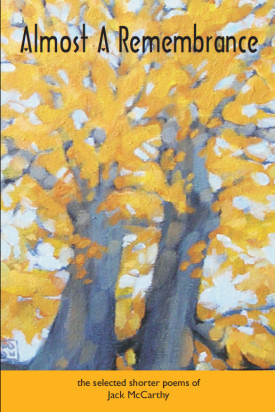
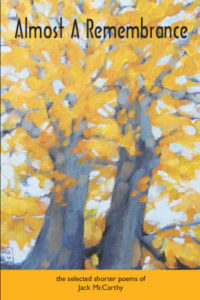 Moon Pie Press, 2011,
Moon Pie Press, 2011,
75 pages, $10.00,
ISBN: 978–1–4507–0741–1
Buy the Book
If you’ve ever heard one of Jack McCarthy’s slam gigs (and I am fortunate enough to have done so), you’ll recognize the qualities that dominate this tome: Entertainment with a capital E, edge
with a small one. Remembrance is a virtuoso recital that demonstrates his verbal range. Two key epigrams are placed before the table of contents. First, there’s Keats: “Poetry should strike the reader as his own highest thoughts, and appear almost a remembrance.” (Even Keats acknowledges the virtue of accessibility!) This gets echoed by Nebraska’s Ted Kooser: “All I ever really wanted to do was give the regular guy something special that he didn’t expect.” We readers are then presented with the polarities of High/Low language and culture, and rhyming vs. free – verse formats. All this is orchestrated in a playful but sometimes self – excoriating tone. The following snippet from “Poet Detained in Airport” reflects the former quality, but suggests the latter:
The clerk asked,
“Are you carrying anything on
from a strange person ?”
The poet said, “Lady,
I am a strange person.”
. . . “Have you been leaving
your baggage unattended ?”
. . . “Of course I have.
That’s how it got to be
my baggage.”
Yet this work does not lack gravitas . . . Indeed, McCarthy,
ex – King of Cambridge’s Cantab Lounge, can “paint a swath” worthy of the B.U. Confessional School (Plath, Lowell) — at will. In the bravura “Irish History Explained in 16 Lines: or, Did You Ever Wonder Why So Many of the Great Writers Are Irish ? ” there’s the lilt of Gaelic syntax, but its brazen first sentence bolts at the reader! Here’s most of it:
As anyone who’s considered being God
will know, at Pentecost the gift was not
of tongues, but ears.
Their lovely bloody language
was the weapon did us in . . .
They pronounced death sentences; listening,
we heard troubadours . . .
It wasn’t us they betrayed, but English.
They didn’t live up to it, they were not grand
enough, magnanimous, and now it’s ours.
. . . because we let
it charm us and seduce us, we own it now
in ways they never did, and never will.
In this astounding paradox, McCarthy maintains that the Irish, who had the bloody English language thrust upon them by their persecutors from the south, actually work the English tongue better! (Subversion, anyone ?)
In his most accomplished poem, “Music Night at Boston Latin,” McCarthy owns up to being captivated by a budding beauty — a girl his daughter’s age. Despite its what – could – be – disquieting subject matter, this poem is filled with uncommon tenderness and irony. It begins:
I wish I could accredit properly
every act before my daughter’s
group, but in all honesty, the only thing
that sticks out in my memory
is the left leg of the first violinist
in the string quartet.
The penitent disclaimer (“I wish I could accredit properly”) is buffered by an arcane meaning of “accredit”: “to make creditable, or reputable; sanction.” And “the only thing that sticks out” is another pun, lending a dose of levity. (Note the objectification of the leg: another reason not to take this soul – baring seriously ? ) McCarthy then takes us, circuitously, down the path of physics, describing how footlights met said leg:
. . . Einstein’s theory about light bending . . .
irrefutably demonstrated here:
in the little sphere of glow
that emanated from a left tibia, which,
in casual repose, seemed slightly curved —
as space itself is curved. . . .
Yet it soon takes a turn for the darker, ending with:
and I supposed that somewhere with
me in the darkness sat a father thinking
gender – treacherous thoughts . . ..
. . . that the boy
had not been born and never would
who could do justice to his radiant jewel.
And somewhere also sat proprietary
the music teacher . . .
who loved her with the kind of old – fashioned
passion that would go to its grave
without ever once becoming
inappropriate.
McCarthy, in the course of the book, leaves behind another travail, that of “Scenes From a Marriage (very late)”: “The counselor said, / ‘I want to begin this session / by asking each of you to say / something nice about the other.’” The voice of Jack’s wife concludes the poem with these remarks:
“When we first married
and we’d disagree,
I would always defer to him.
For years I did.
Sometimes I’d ask myself why,
and I’d suppose it was because
he had a fine mind,
that he just knew
more than I did.”
“Now I think it’s simply because
he speaks in complete sentences.”
Eventually, McCarthy finds contentment with “the fabulous Carol” (as described in his bio). The quality of their late – life marriage is drolly “qualified” by this Nathaniel Hawthorne quote: “We are as happy as people can be, without making themselves ridiculous, and might be even happier; but, as a matter of taste, we choose to stop short at this point.”
The last section of “Remembrance” — “BRITISH ADDRESSES” — is, unfortunately (to my mind), uneven. Here McCarthy puns in a racy manner on clunky place – names conceivable only in the U.K.
( gleaned from a job compiling databases ). Yet some elbow – pokes, on the page, lack the ever – effective inflections that Jack’s noted for on – stage.
On – stage, they rock! National and international crowds have had their cover charge amply repaid with golden metaphor; I witnessed the McCarthy Mesmerism Act when I booked Jack to read at Geno’s Rock Tavern, back in the Brown Street days. SRO, as befits a legend.
As to the present: Jack is battling lung cancer. Buy this book. (A mere $10!) The karma you earn will be a blessing to him; the text will be a blessing to you. One final epigram, a Dylan Thomas quote printed opposite the author’s bio and photo, is sadly appropriate: “I said some words to the close and holy darkness, and then I slept.”
Godspeed with your next book, Jack.
— reviewed by Peter Manuel
Farang
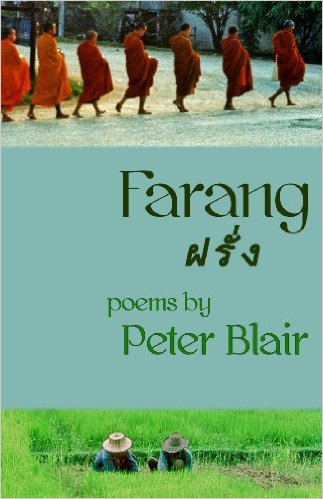
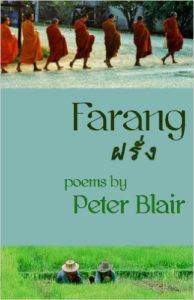 by Peter Blair,
by Peter Blair,
Autumn House Press, 2009,
64 pages, paper, $14.95,
ISBN: 978–1–932870–34–3
Buy the Book
“Farang,” we quickly learn in Peter Blair’s book about his years in the Peace Corps, means “foreigner” in Thai. The clear images of these melodic narrative poems evoke the legacy of the Vietnam War years, the tensions between Thais and ex – patriot Americans, the struggle to cobble together a pathway between cultural differences, and the lyrical beauty of Thailand and its peoples.
The book introduces the first of its four sections, “November Full Moon,” with the poem, “Discussing the Dream of Culture with Professor Kwaam,” in which an ethereal, clean – shaven, smiling Professor Kwaam pontificates on Thai and American cultures — “two dreams / of one world, the Dharma. A few months ago / he taught me Thai and how to read palms: / A good way to hold hands with a girl. He winked.” The novice poet – traveler is in need of instruction:
Noodles slip off my novice chopsticks.
My soup darkened by soy sauce, peanuts,
sugar, the strands disappear in my bowl.
Kwaam’s noodles twine in clear broth.
Of course, the poet meets a girl. Her name is Siripan. She’s young and beautiful, a school teacher who instructs the poet in vocabulary and demonstrates the ramwong, a kind of waltz, “spinning / through all the positions that turn / a man and woman into blossoms.” But Siripan is already lost, drifting from her family, which does not approve of her dating farangs. Siripan and the poet share stories of their fathers and grandfathers. “They traveled far to find their wives,” Siripan says poignantly. “Our kiss feels like an ocean, / its waves breaking on opposite shores.” So far no one has traveled far to marry Siripan, who appears later in the book only as a longing, a memory.
After visiting a Buddhist temple, the poet tours the bars and brothels of Bangkok, the Angel City, with his boorish American friend Harry, who “tramples / his shadow with his feet / seeking all joys but wisdom / among the metal – grated storefronts, / the butcher – shop, fortune – teller, apothecary, serving the bodily / charkas of the city.” Leaving Bangkok for the countryside, the poet is haunted by ghosts and nightmares featuring Kukrit from The Ugly American, and wakes to the slow turning blade of his ceiling fan: “farang, farang, farang.”
In section two, “Up – country,” the poet – narrator keenly observes scenes of village life: He visits temples on whose walls human figures “pursue their karma”; he joins in the rice planting, standing ankle deep in the fields beside the buffalo; he attends a village fair where he is accosted — farang! — by village youths and wins an ivory Buddha which “hangs on my chest, / smooth as a stone that’s been sunk / in flowing water for 25 centuries.” In “In the Hot Season,” a boy not much younger than the poet’s own twenty – one years floats on the river in the noonday heat. This poem, exemplary of Blair’s best, describes a boy floating on “wide, brown water” in a river “starved of rain”, where tree roots “show through like gray ribs / near the banks.” The boy’s canoe is merely a packing tin “emptied of bamboo shoots.”
The poem’s easy cadences foreswear meter and rhyme for subtle alliteration — “gunwales gleaming,” “wide, brown water” — and strong, graceful lines and syntax, with line breaks punctuating the unfolding narrative, following the grammatical units of meaning. While not especially playful, inventive, or surprising — highly valued qualities in much contemporary poetry — Blair is adept at seeing beneath the surface of the sensory world to the feelings and desires of the boy, the boy’s pleasure in a lazy day on the river, his cotton shirt “a white flag draped over the side, signaling / his surrender to a day without desire.” Blair imbues the boy with the deep qualities of his culture: When the boy’s “eight – fold path lies across / low water cradled by gnarled hills,” he becomes an emblem of his culture’s Buddhism. The final stanza zooms out, giving the reader a wide – screen view:
As the rumbling, spattering caravan
of trucks, buses and tuk – tuks pass
over him on the bridge on their raucous
way to Bangkok, the Angel City,
he floats diamond – bright and solitary
in the middle of the sweltering town.
Halfway from either bank, he finds
the bright center of the afternoon.
And the poet, too, finds the bright center of the poem.
At the close of this second section, the poet travels with his students by bus to the Gulf of Siam, where Ampon, one of his young students, has promised to reveal his secret beach near his house there. But then, suddenly, the festive occasion turns hollow and ghastly: Ampon drowns.
Word spreads through the palms, mangoes
and village streets. His father descends stairs
under his house, walks out into the light,
watching me. My skin never feels so white.
In the house, his mother wails, prepares the body.
“My skin never felt so white” is one of several striking expressions of the poet’s own otherness. The moment of silent confrontation between the father whose son has died and the poet, the climax of these first two parts, has its formal complement in sections three and four, “The Dream of Culture” and “The Land of Transit.” Among Blair’s reflections on the two cultures, he tells us that word has come from the American Consul of his own father’s death in Pittsburgh. He is now the fatherless boy, the one abandoned.
Back in the States for the funeral, at the close of this tender, sensitive collection, the poet stands awkwardly at O’Rourke’s Bar and Grill with his old classmates. And once again, this time to the big, hairy – chested American boys he’s known since grade school, he finds himself farang.
— reviewed by Zara Raab
Episode 51: Andrew Abbott: Psychedelic Artist
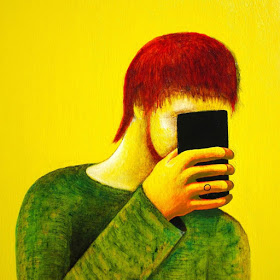
Check out this cool interview with Sean Kneese, the cover artist of our latest issue. He even mentions us the Café Review.In this episode Sean Kneese talks to psychedelic/experimental artist Andrew Abbott. Abbott talks about life as a painter, his time as a medic in the military, the influence behind his work, and his experience with marketing himself and participating in art shows. Check out his website here: http://allabbott.com/



